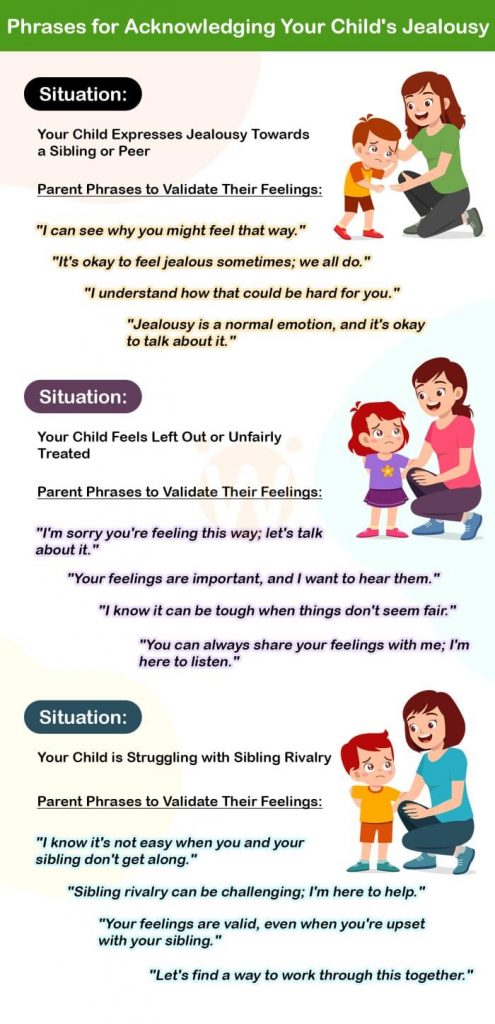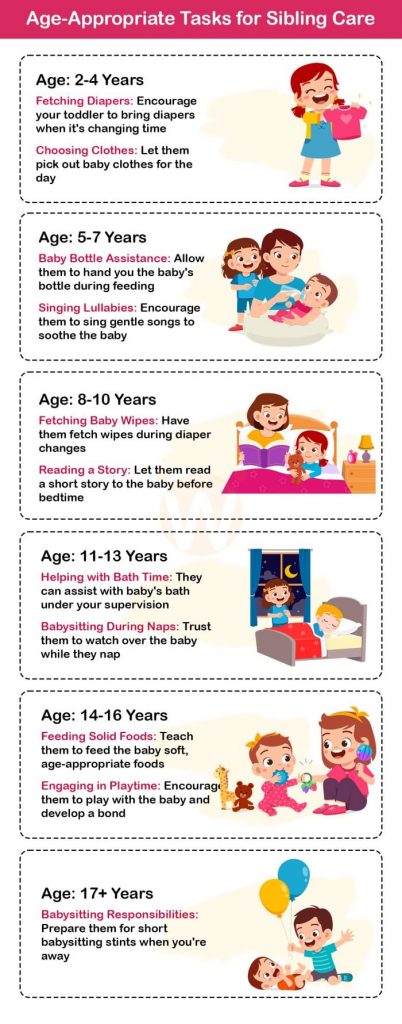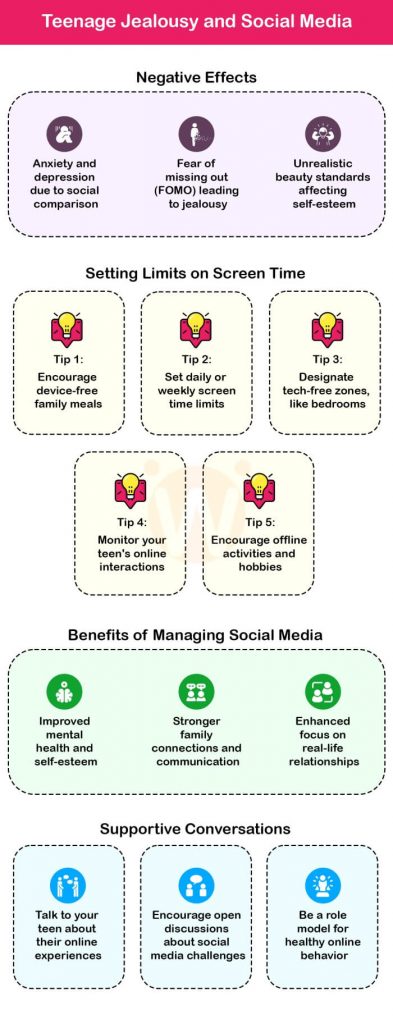Helping Your Child Deal with Jealousy: A Comprehensive Guide for Parents
By Prapoorna M
Last Updated: November 26, 2021
Jealousy is a familiar visitor in the world of parenting, often showing up unannounced when you least expect it. It’s a feeling that can emerge in children of all ages, from the tiniest tots to the more mature teenagers. As parents, it’s crucial to recognize that jealousy is a natural and common emotion among children. This article aims to shed light on the significance of acknowledging and helping children cope with jealousy, offering practical guidance for parents at every stage of their child’s development.

The Common Occurrence of Jealousy in Children:
Jealousy is like a rite of passage for kids; it’s something most of them experience at some point in their lives. Whether it’s sparked by the arrival of a new sibling, a friend’s achievements, or simply feeling left out, jealousy can manifest in various forms. Young children might become clingy or act out, while older ones might struggle with comparing themselves to their peers or feeling overlooked. The truth is, jealousy is part and parcel of growing up, and it’s vital for parents to recognize and address it.
The Importance of Addressing and Helping Children Cope with Jealousy:
Jealousy in children often stems from feelings of insecurity and fear. Left unaddressed, these emotions can fester, affecting a child’s self-esteem, relationships, and overall well-being. However, when parents actively engage with their children to help them navigate and manage jealousy, it can lead to healthier emotional development.

By addressing jealousy, parents not only provide emotional support but also teach valuable life skills. Children learn how to express their feelings, empathize with others, and develop resilience in the face of challenging emotions. Moreover, by helping children cope with jealousy, parents contribute to creating a more harmonious family environment where love and understanding prevail.
Practical Tips for Parents at Every Stage:
This article aims to be your guide through the maze of childhood jealousy. Whether you’re parenting a toddler, a grade-schooler, or a teenager, we’ve got you covered. We’ll provide practical and easy-to-implement strategies that are tailored to your child’s age and development stage. These strategies will help you reassure your child’s love, maintain their emotional well-being, and promote positive interactions with siblings, friends, and peers.
Dealing with jealousy is essential for parents, just as addressing other complex emotions like those experienced by children with Autism Spectrum Disorder.
So, join us on this journey as we explore the art of helping your child deal with jealousy. Together, we’ll equip you with the tools and insights you need to nurture emotionally healthy and confident children at every stage of their growth.
Dealing with Jealousy in Young Children
Young children often grapple with jealousy, especially in situations like the arrival of a new sibling. In this section, we’ll explore strategies to help parents navigate this challenging phase, ensuring their child feels loved and secure.

Reassuring Your Child’s Love:
Young children thrive on love and reassurance. When jealousy strikes, it’s crucial to emphasize your child’s importance within the family structure. Here are some ways to do that:
- Verbal Affection: Express your love through words regularly. Say things like, “We will always love you so very much, no matter how much our family grows.” Remind your child that they hold a unique place in your heart.
- Quality Time: Dedicate special moments just for them. Play games, read stories, or have one-on-one conversations. These moments reinforce their significance in your life.
Managing Attention Shifts:
The arrival of a new sibling can bring about shifts in attention that might trigger jealousy. Here’s how to help your child adapt:
- Open Communication: Talk to your child about the need to focus on the new baby occasionally. Explain that it doesn’t diminish your love for them but ensures the baby’s well-being.
- Shared Moments: Encourage shared activities, like diaper-changing or baby feeding, when appropriate. Involve your child in caring for the baby to help them feel included and valued.
Involving the Child:

Giving your child age-appropriate tasks related to the new sibling can be empowering and alleviate jealousy:
- Simple Responsibilities: Assign tasks such as fetching a diaper, choosing the baby’s onesie, or singing a soothing song. These small contributions make the child feel helpful and appreciated.
Age-Appropriate Chores
| Age Range | Chores for Involving Children in Caring for Siblings |
|---|---|
| 2-3 years | – Handing baby wipes or diapers – Singing a lullaby to the baby – Picking out baby’s clothes (with guidance) |
| 4-5 years | – Bringing a diaper or bottle when needed – Gently holding the baby (with supervision) – Assisting with baby’s bath (under supervision) |
| 6-8 years | – Setting up the baby’s play area – Fetching clean diapers or baby toys – Reading a simple story to the baby |
| 9-11 years | – Helping with baby’s feeding (under supervision) – Assisting in baby-proofing the home – Supervising the baby during playtime in a safe area |
| 12+ years | – Babysitting for short periods (with proper training) – Preparing simple baby meals (under supervision) – Engaging in educational play with the baby |
Maintaining Routine:
Children thrive on routine, and major life changes, like a new sibling, can disrupt their sense of security. Here’s how to strike a balance:
- Consistency is Key: Emphasize the importance of maintaining your child’s usual routine as much as possible. Continue bedtime stories or serving their favorite breakfast to create stability in their day.
- Flexible Adaptation: While routines are important, teach your child about flexibility. Explain that sometimes, adjustments are necessary, but their needs and feelings remain a top priority.
Seeking Help:
It’s okay to seek support from trusted friends or relatives to ensure both your children receive attention:
- Reliable Assistance: Reach out to dependable individuals who can care for the new baby temporarily. This allows you to dedicate quality time to your older child, reinforcing your bond.
Avoiding Comparisons:
Comparing children can intensify jealousy and undermine their self-esteem. Here’s how to address behavioral issues positively:
- Individual Feedback: Instead of making comparisons, address specific behaviors directly. Say something like, “I know you have a lot of energy, but would you mind playing with your toys downstairs while I finish changing your brother’s diaper?” This way, you focus on their actions rather than pitting them against their sibling.
By implementing these strategies, parents can help young children navigate jealousy more effectively, ensuring a loving and harmonious family environment.
Coping with Jealousy in Preschool and School-Aged Children
As children grow, their understanding of emotions matures, but jealousy can still pose challenges. In this section, we’ll explore strategies to help parents support older children in managing jealousy and building healthy relationships.
Acknowledging Jealous Feelings:
It’s essential to encourage parents to validate their child’s emotions and provide the right words to express understanding:
- Validation is Key: Explain to your child that feeling jealous is okay, and many people experience it. Let them know that their emotions are valid.
- Understanding Phrases: Offer phrases like, “I understand that you’re upset about not getting the same attention,” or “It’s okay to feel jealous sometimes, and I’m here to listen.”
Phrases for Validating Feelings
| Situation | Sample Phrases for Validation |
|---|---|
| Sibling receiving more attention | – “I can see why you might feel that way.” |
| Not getting a desired toy | – “It’s okay to feel upset when you can’t have something.” |
| Feeling left out at playtime | – “I understand that you’re feeling left out right now.” |
| Jealous of a friend’s abilities | – “It’s natural to feel jealous when others excel.” |
| Comparing themselves to others | – “I see that you’re comparing yourself to them.” |
Encouraging Honesty:
Open communication is vital in addressing jealousy. Guide parents on fostering honesty:
- Create a Safe Space: Let your child know they can talk to you about anything without judgment. Explain that honesty is important in your family.
- Thanking for Honesty: Whenever your child shares their feelings, thank and praise them for being honest. This positive reinforcement encourages them to continue opening up.
Giving Jealousy a Silly Name:
Introduce a playful technique to help children separate jealousy from their identity:
- Externalizing Jealousy: Teach your child that jealousy is just a feeling, not who they are. Use fun nicknames for jealousy, like “Jealous Jake” or “Envious Emma.” This way, children can view jealousy as an outside force they can manage.
Focusing on Strengths:
Promoting self-esteem and self-worth is essential to combat jealousy:
- Highlighting Unique Qualities: Encourage parents to remind their child of their unique qualities and talents. Say things like, “You’re so good at art” or “You’re a star basketball player!” This helps children focus on their strengths rather than comparing themselves to others.
- Building Confidence: Reinforce statements like, “You’re such a kind, sweet, and genuine person,” to boost your child’s self-confidence.
Teaching Sharing and Complimenting:
To foster positive behavior, guide parents on teaching children to share compliments and address jealousy politely:
- Complimenting Others: Encourage your child to share compliments when they feel jealous. Phrases like, “You did an amazing job on that project” or “I’m impressed with your performance” help redirect their feelings positively.
- Polite Conversations: Teach your child how to express jealousy politely to others. For instance, they can say, “You’re really good at math, and it makes me feel a bit jealous, but I don’t want that to affect our friendship.” This promotes healthy communication and relationships.
By implementing these strategies, parents can help their preschool and school-aged children understand and manage jealousy, fostering emotional growth and positive interactions with others.
Helping Teenagers Cope with Jealousy
Teenagers face unique challenges when dealing with jealousy. In this section, we’ll explore strategies for parents to support their teens in managing jealousy effectively.

Social Media Awareness:
Discuss how social media can exacerbate teenage jealousy and offer solutions:
- Social Media Impact: Explain that social media often portrays idealized lives and relationships, which can lead to unrealistic comparisons and feelings of jealousy.
- Setting Limits: Suggest parents set time limits for social media usage to help teenagers disconnect and reduce exposure to jealousy-inducing content. Encourage occasional breaks from social media to promote a healthier perspective.
Supporting Interests:
Highlight the importance of nurturing teenagers’ self-esteem and interests:
- Boosting Self-Esteem: Remind parents that boosting their teen’s self-esteem is crucial. Encourage them to acknowledge and celebrate their teenager’s achievements, whether in academics, sports, or hobbies.
- Supporting Hobbies: Recommend that parents actively support their teen’s hobbies and interests. Enrolling them in classes or providing resources shows that their passions matter.
Benefits of Supporting Teen Interests
| Benefits | Examples of Supportive Actions |
|---|---|
| Boosts self-esteem and self-confidence | – Enroll your teen in art classes. |
| Encourages self-expression and creativity | – Attend their sports games or performances. |
| Fosters a sense of independence | – Provide resources for their chosen hobby. |
| Strengthens the parent-child bond | – Show genuine interest in their hobbies. |
| Develops time management skills | – Help them create a schedule for their hobby. |
| Provides a healthy stress outlet | – Encourage them to share their interests. |
Setting a Positive Example:
Emphasize how parents can influence their teenager’s ability to manage jealousy:
- Parental Behavior: Stress that parents’ behavior serves as a model for their teenagers. Encourage parents to demonstrate healthy jealousy management in their own lives.
- Real-Life Scenarios: Share real-life scenarios where parents can set a good example. For instance, if a parent faces competition at work, they can say, “I may feel a bit jealous of my colleague’s success, but I know that we all have our unique strengths to contribute.”
Coping with Rejection:
Acknowledge the emotional challenges teenagers encounter in romantic relationships:
- Understanding Rejection: Explain that rejection is a normal part of teenage relationships, and it doesn’t define a person’s worth.
- Comforting Words: Provide comforting words for parents to share with their teens, such as, “I know it’s tough seeing your crush with someone else, but remember, there will be plenty of opportunities for meaningful relationships in the future.”
Avoiding Teasing:
Highlight the importance of respecting a teenager’s emotions during difficult conversations:
- No Belittling: Stress that parents should never belittle their teenager’s emotions or tease them about jealousy. It’s important to take their feelings seriously.
- Alternative Approaches: Share alternative ways to address jealousy or difficult conversations without resorting to teasing. For example, instead of making light of their feelings, parents can say, “I understand you’re going through a tough time. Let’s talk about it and find solutions together.”
By implementing these strategies, parents can help their teenagers navigate the complexities of jealousy during this crucial stage of development, promoting emotional resilience and healthier relationships.
Conclusion:
In conclusion, jealousy is a common and natural emotion that children of all ages may experience. This article has provided valuable insights and practical strategies to help parents address and support their children in coping with jealousy at various stages of development.
Throughout this article, we’ve explored effective ways to deal with jealousy in children, starting with reassuring love and affection for young ones, managing attention shifts, and involving children in caring for new siblings. We’ve also emphasized the importance of maintaining routines, seeking help when needed, and avoiding comparisons between children.
For preschool and school-aged children, we’ve discussed acknowledging their jealous feelings, encouraging honesty, giving jealousy a silly name to separate it from their identity, focusing on their unique strengths, and teaching them to share compliments and positive feedback.
In the teenage years, social media awareness becomes crucial, along with supporting their interests and setting a positive example in jealousy management. We’ve also addressed coping with rejection and stressed the importance of avoiding teasing when discussing jealousy.
It is vital for parents to remember that helping children navigate jealousy is not only about addressing the present emotions but also about equipping them with valuable life skills. By nurturing emotional intelligence and resilience, parents can contribute to their children’s overall well-being and future success.
We encourage all parents to implement the strategies discussed in this article, tailored to their child’s age and needs, to create a more harmonious family environment. By fostering open communication, understanding, and empathy, parents can guide their children towards healthier relationships, both with themselves and with others.
In supporting our children through their jealous moments, we empower them to grow into confident, emotionally aware individuals who can navigate life’s challenges with grace and resilience.
Frequently Asked Questions on Helping Children Cope with Jealousy
1. Is it normal for children to feel jealous?
Yes, it’s entirely normal for children to experience feelings of jealousy. Jealousy is a natural emotion that can arise in various situations, such as the arrival of a new sibling, comparisons with peers, or changes in their routine.
2. How can I reassure my child’s love when a new sibling arrives?
Reassuring your child’s love involves emphasizing their importance in the family. You can provide examples of affectionate reassurance by spending quality time with them, expressing your love verbally, and showing physical affection.
3. What can I do if my child becomes aggressive due to jealousy?
If your child acts out aggressively due to jealousy, it’s essential to focus on the safety of all involved. Instead of giving attention to the aggressive behavior, redirect your attention to the situation and ensure the well-being of your child and others. Depending on their age, you may need to include appropriate consequences for their actions.
It’s important for parents to adapt their parenting styles when addressing jealousy issues.
4. How do I encourage honesty in my child when they’re feeling jealous?
Encourage honesty by creating a safe and non-judgmental environment where your child feels comfortable sharing their feelings. Thank and praise them for being honest about their jealousy, reinforcing the importance of open communication.
5. What is the significance of giving jealousy a silly name?
Giving jealousy a silly name helps children separate the feeling of jealousy from their identity. This makes it easier for them to acknowledge and manage their emotions, viewing jealousy as a temporary visitor rather than a defining characteristic.
6. How can I support my teenager in coping with jealousy arising from social media?
Support your teenager by discussing the impact of social media on jealousy and helping them set healthy boundaries, such as time limits or taking breaks from social media. Encourage them to focus on real-life interests and hobbies that boost their self-esteem.
7. Why is setting a positive example important in helping teenagers cope with jealousy?
Setting a positive example is crucial because teenagers often learn from their parents’ behavior. By modeling healthy jealousy management, parents can teach valuable life skills and demonstrate effective ways to deal with jealousy in relationships.
8. What should I do if my child is jealous of their peers at school?
If your child is jealous of their peers at school, encourage them to share their feelings honestly with their friends. Teach them how to express their jealousy politely and offer compliments to others, fostering positive interactions and reducing negative emotions.
9. Is it okay for parents to feel jealous themselves?
Yes, it’s entirely normal for parents to experience jealousy at times. However, it’s essential to manage and cope with these feelings in healthy ways, avoiding any negative impact on your children. Use your own experiences as opportunities to model positive jealousy management.
10. How can I maintain a harmonious family environment while addressing jealousy?
Maintaining a harmonious family environment involves implementing the strategies discussed in this article, tailored to your child’s age and needs. Foster open communication, understanding, and empathy within your family, promoting healthier relationships and emotional well-being for all members.
If any of the techniques you deal with doesn’t work and you feel like seeking an expert’s opinion and help on growing your child to be a better person, Wellness Hub is here to help you. The techniques and psychoanalytical methods used by our experts at Wellness Hub gains the trust of our clients, whose information is always kept confidential under any circumstances. Book an appointment today.
About the Author:
Prapoorna Mangalampalli, Psychologist
Prapoorna, an author with dual master’s degrees in Psychology and English, excels in exploring and enhancing human experiences. Her writing, characterized by deep empathy and insight, primarily focuses on the complexities of counseling, spanning areas such as online, marital, relationship, child, family, and career counseling. Specialized training in various counseling sectors underscores her dedication to positive change. In her blogs, Prapoorna offers valuable guidance and a unique perspective for parents of children with Autism and special needs, creating a supportive community in this realm.
Book your Free Consultation Today
Parent/Caregiver Info:
Client’s Details:
* Error Message









